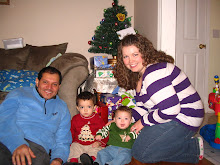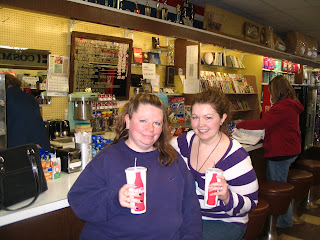Since I often mention Bryce's eating "issues," I suppose I should explain. This is partly therapeutic for me because I have never written his story down. So allow me to vent for a moment.
From infancy, we suspected something was up with Bryce's ability to eat, as he would drink only a few ounces of formula at a time even past the age of 6 months. By the time he was a year old, he was still drinking only 4-5 ounces while most babies his age were downing 8-10.
I introduced solid foods to him around 5 months, and he seemed interested at first. But around the age of 8-9 months, he completely lost interest in food. He would still drink the meager amount of formula that was typical of him, but he would cry and turn away every time food was offered to him. It was as if he was being tortured when we tried to feed him.
This was (and still is) a very challenging, frustrating, maddening, saddening thing for me and my husband. We both love to cook. We both love to eat. We both love to feed our children wonderful foods. But Bryce would rather do anything than eat most days. And his weight began to show it – at 12 months, he was just 17 pounds and not even on the growth charts.
At the suggestion of his pediatrician, we took him to Vanderbilt Children's Hospital to see a nutritionist. As I suspected, after making a food diary of his eating habits for a week, we learned that he was getting only about 600 calories a day (mostly from formula) – roughly half of the 1,100 calories he needed to thrive. He was diagnosed with "failure to thrive." I cried for hours. I felt like a failure as a mother. (I have since decided that the term "failure to thrive" should be eliminated from doctors' vocabularies, as it is traumatic for a parent to hear. A child with "failure to thrive" is simply failing to gain wait appropriately.)
The nutritionist suggested adding as much fat and calories as possible to everything Bryce would eat – in other words, bring on the butter, gravy, mayonnaise, french fries and any other fatty substance you can think of that you thought you
weren't supposed to feed your child. She also suggested switching him from infant formula to Pediasure to up the number of calories he would consume. (Did I mention Pediasure is a whopping $11 for a six-pack, or a two-day supply?)
We also began feeding therapy sessions at Vanderbilt's Bill Wilkerson Center, a facilty devoted to speech therapy that also includes addressing feeding issues in children. We did this for a few months, but all it served to do was empty our bank account. The therapist would sit Bryce down in a high chair and offer him things like applesauce or pepperoni slices. Then she would evaluate his reactions (which often ended in crying fits) to such foods and encourage him to touch them, if not eat them. Eventually I decided to quit the feeding therapy because it seemed like nothing I couldn't do with Bryce myself at home. I began encouraging him to play with his food and stopped telling him to eat it.
There may be some truth to that notion. If a child doesn't want to touch a food, he can't be expected to eat it. The one helpful thing I learned from feeding therapy was there are "steps to eating" for kids with food issues. First, they should become comfortable with touching a food. Then, they should be encouraged to simply touch the food to their lips – or "kiss the banana," as the therapist would say. Next, it is expected that a child should put the food in their mouth, after which they can spit it out. And lastly, a child should chew and swallow.
To further complicate the eating situation, Bryce is a puker. (Excuse me for being so frank.) He vomits at least once a week. He has a hyper-sensitive gag reflex that often means even if he chooses to swallow a food, he may gag on it and then vomit. He also vomits from crying, and the older he gets, he is learning to use that to his advantage. Lovely for us as parents.
After the feeding therapy, we took Bryce to a pediatric GI doctor, who put him on reflux medicines to no avail. She then suggested a barium test, which we proceeded to do. The test consisted of Bryce drinking (we had to force it down him with a syringe) a chalky substance which was x-rayed as it was digested. No internal problems were found in his digestive system.
The next step was an upper endoscopy, where he had to be put to sleep and the GI doctor put a tiny scope (camera) down his throat to check for abnormalities in his esophogus and intestines. That was traumatic for all of us. It took me weeks to even go through with it. I did not want to subject him to being put to sleep and all the crap that goes along with a hospital procedure. But we had to know that his anatomy was correct, so we finally did it. Everything came back normal. That was good and bad news ... good that he had no internal problems, bad because we still had a baby (now a toddler) who would not eat.
That brings me to now. Bryce turned 2 in December, and for the second birthday in a row, he refused to eat cake at his own party. Ok, him not eating cake is the least of my worries. But it still demonstrates his lack of desire for foods most kids go crazy over.
We are still struggling with feeding him. He will munch on goldfish crackers, Cheetos, and other crunchy things occasionally. He will drink the broth from soup but will never eat the meat or veggies. He will take a few bites of pasta or mashed potatoes – and by a few, I do mean two or three – and be done. He will sometimes eat a bite or two of the baby food I am feeding his little brother, Brett. But overall, he is still not fond of food. We supplement his diet with Pediasure still, so that fills in the gaps for the most part. He is now 22 pounds, and we are thankful for every ounce of that 22 pounds!
So there you have it. Bryce's eating story in a nutshell.
But did I mention how smart the child is? I guess that is subject matter for another post.
























